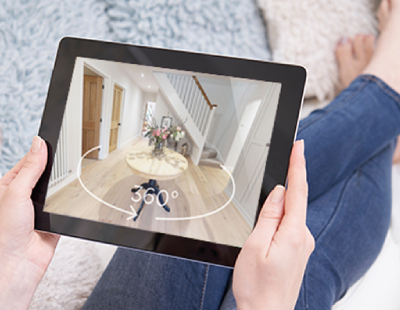During this period, virtual tours have proven to be a lifeline for estate agents, helping them rise to the challenges they have been faced with and enabling operations to resume swiftly and effectively.
What about the long-term?
The current situation has thrust virtual tours into the spotlight, receiving kudos as a safe and appropriate alternative to physical property viewings.
Prior to the pandemic, virtual property tours were perceived to be an expensive nice-to-have, but non-essential marketing tool, reserved for more premium property listings, where the return on investment could be justified.
However, digital imaging technology has moved on considerably in recent years, producing high-quality output that is much more accessible and affordable for any size and price of property.
As the UK housing market starts to stabilise and lockdowns ease, what does the future look like for estate agent marketing and the way buyers view listed properties? Will we return to ‘normal’?
While some agents are sceptical of the long-term value in virtual property marketing, many are embracing this technology with open mindedness and realising the wider benefits it brings, considering virtual tours just as important as good photography on their marketing checklist.
What are the benefits and ‘added’ value?
With many options and interpretations of virtual property marketing available, it is important that estate agents do their research. Technology has opened the door to lots of possibilities, with some agents opting to use live video chats like WhatsApp or FaceTime; others are using self-filmed or professionally edited videos, while many are choosing the latest in 3D virtual tour technology.
The latter offers seamless high-resolution simulations of a property, providing fully immersive and interactive 360 walk-throughs, putting the user in the driving seat. This powerful technology enables the viewer to explore every inch of a property in high definition, at a pace that suits them, with access to accurate floor plans, quality photography, 3D dollhouse views and simple room measuring tools.
Improved marketing assets will generate increased interest, drive engagement and ultimately lead to quicker sales. Having of a virtual tour available will open up access to more people, including those with limited mobility, or health conditions that will prevent them from going to a physical viewing and also potential buyers living overseas.
Where virtual property tours can really add value, is with the efficiencies they bring, being able to pre-qualify buyers and eliminate time wasters, reduce the inconvenience and time spent on arranging physical viewings and minimise the disturbance caused to vendors.
Changing customer expectations
With an increasing number of estate agents now offering virtual property viewings, customer expectations have started to shift. More house buyers are seeking the availability of virtual tours as part of their searches, enabling them to vet properties quickly and efficiently from the comfort of their own home, without the hassle of attending multiple viewings in person.
Virtual property viewings will most likely become the ‘norm’. Property Portals like Rightmove, Zoopla and OnTheMarket already highlight property listings that have virtual tours available, making them more readily accessible to prospective buyers during their property searches.
What the future holds
As we are still in the throes of the unknown, many estate agents will continue to keep safety at the forefront, putting appropriate and responsible measures in place when it comes to property viewings.
This suggests virtual tours in today’s property marketing are here to stay and the recent rise to prominence has simply highlighted what this technology is capable of bringing to the industry.
The future looks bright for virtual tours, with yet more new technology on the horizon. One such development being talked about is ‘virtual staging’. This powerful technology is more than just a walk-though of an existing property, but a tool to help prospective buyers plan and visualise what their new home could look like.
Selecting and placing virtual furniture, fixtures and fittings, changing wall colours and floors of a property, enables the potential buyer to take the next level when choosing a property. Virtual staging will also be useful for unfurnished properties, where empty rooms are hard to visualise.
Using virtual furnishing prior to marketing an unfurnished property, would help prospective buyers to better visualise the functional space.
There will undoubtedly always be a place for physical property viewings, for buyers who will ultimately want to view the bricks and mortar of their future home in person, before they make that final decision on one of life’s biggest expenses.
However, the positive impact that virtual tours have had on property marketing in recent months, will most certainly lead to them becoming an integral element of the house buying process, improving accessibility and efficiencies for all parties involved.
*Stewart McRae is Sales Director at CoreLogic UK
























Join the conversation
Jump to latest comment and add your reply
Great product, like a few others, It’s a dichotomy though this. Is the intention to rule out a time waster or to generate more interest. I guess no time wasters but less interest, just positive interest. I’ve had a real mixed response. Do you know where the buyer enters the house and says “ This is so much better than I thought“, if they had seen a virtual tour, would they have attended at all? Is it better to keep somethings hidden a little. No right or wrong answers here I think, just different models for different agents?
Please login to comment